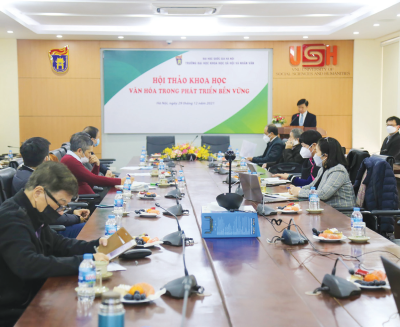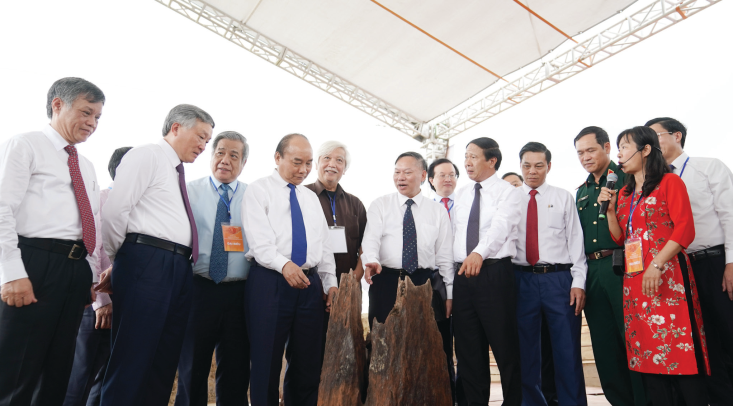 The VNU Newsletter conducted an interview with Professor Hoang Anh Tuan, Rector of the University of Social Sciences and Humanities, VNU, regarding his views on VNU's science, technology, and innovation strategy and the university's future direction in science, technology, and innovation.
The VNU Newsletter conducted an interview with Professor Hoang Anh Tuan, Rector of the University of Social Sciences and Humanities, VNU, regarding his views on VNU's science, technology, and innovation strategy and the university's future direction in science, technology, and innovation.
Professor, could you please share your opinion on the recently issued Science, Technology and Innovation Strategy for the period 2021-2030 of Vietnam National University, Hanoi?
Globally and in Vietnam, universities must proactively adapt to the evolving socio-economic landscape. Facing the Fourth Industrial Revolution, as a multidisciplinary and multi-field educational center, Vietnam National University, Hanoi (VNU) is leveraging its advantages to successfully build a smart, innovative university model, striving to enhance its capacity to adapt to the global trends in higher education transformation. On February 8, 2022, the Director of VNU signed Decision No. 286/QD-VNU promulgating the Strategy for the Development of Science, Technology, and Innovation of VNU for the period 2021-2030. In my opinion, this is a significant milestone and a crucial foundation, serving as a guiding principle for VNU's activities in the coming period.

The current volatile and risky environment places stringent demands on the creative capacity and technological expertise of Vietnam's workforce in general. In the context of a growth model focused on improving labor productivity, the quality and competitiveness of education in general, and universities in particular, play a crucial role in promoting innovation. This is also the first and most important perspective expressed in the Vietnam National University, Hanoi's science, technology, and innovation strategy.
The Vietnam National University, Hanoi's (VNU) Science, Technology, and Innovation Strategy is concise, succinct, yet clear and detailed, reflecting the potential, strengths, and determination of VNU as a whole and its member units in particular. This is a completely proactive step to seize opportunities and effectively respond to future challenges, contributing to the effective achievement of VNU's goals in the coming period. Here are some impressive points from the Strategy:
Firstly, this Strategy is consistent with the orientations and policy documents of the Party and State in the recent period: Resolution of the 13th National Congress of the Party; the 10-year Socio-Economic Development Strategy 2021-2030; Resolution No. 23-NQ/TW dated March 22, 2018 of the Politburo on the orientation for building national industrial development policies until 2030, with a vision to 2045; Resolution No. 52-NQ/TW dated September 27, 2019 of the Politburo on some guidelines and policies for proactively participating in the Fourth Industrial Revolution,... This Strategy concretizes the guidelines and policies of the Party and State on the development of science, technology and innovation; and demonstrates the concern and joint efforts of Vietnam National University, Hanoi in building and developing the national innovation ecosystem. Furthermore, this Strategy also realizes the goals related to science, technology, and innovation as expressed in the Resolution of the 6th Congress of the Party Committee of VNU Hanoi for the 2020-2025 term with the motto: Innovation - National Responsibility - Sustainable Development, as well as in the VNU Hanoi Development Strategy to 2030, vision 2045, issued on March 29, 2021.
Secondly, the use of the phrase "Innovation" in the strategic document on the development of science and technology activities reflects the spirit of innovation, aiming to build an innovative university, a smart university, and a University 4.0 of VNU. In my opinion, the core of adding this phrase lies in linking/integrating creative activities into all activities, all fields, and all levels to create sustainable value and momentum for development. This is the spirit that VNU has always pursued.
Thirdly, through the goals, tasks, and solutions outlined in the Strategy, we see the importance of fostering and encouraging the development of both internal and external resources, especially human intellect, through interconnectedness, collaboration, and joint implementation of scientific, technological, and innovative activities, rather than individual, isolated operations.
- Professor, how will this strategy promote research and innovation activities at Vietnam National University, Hanoi?
As stated above, I believe this Strategy will strongly promote scientific research and innovation at VNU, from "thinking" to "action":
Building and fostering an "innovative" mindset among managers, students, teachers, and researchers is crucial. Educational institutions function to provide human resources for the innovation activities of society. Without the motivation for innovation, coupled with increasing competition among educational sectors, universities risk falling behind or stagnating. Therefore, both the trained and educated workforce must be equipped with the necessary thinking and skills for this endeavor. Within universities, an environment must be created where young people can become familiar with research, creativity, critical thinking, problem identification, and problem-solving. This creative environment will foster innovative thinking and gradually form a culture of innovation. The output of the training process in the context of the Fourth Industrial Revolution is a workforce with the capacity and spirit of innovation.
Building an innovation ecosystem and connecting it with activities at the unit, regional, and national levels is crucial. Connecting with other elements within the science, technology, and innovation system will help promote innovation based on the strengths of all parties, bringing universities closer to the needs of businesses and society. To facilitate this, the solutions outlined in the Strategy include flexible mechanisms that promote the autonomy of units in training and scientific research. This will create favorable conditions for effective linkages between universities, research institutes, businesses, and the government; between domestic and international organizations; and between the private sector and the market. This will support the development of a synchronized ecosystem from basic research and application to pilot production and commercialization.
Aiming for outputs that are applied and valuable in terms of science, economics, and society, reflecting the prestige and brand of Vietnam National University, Hanoi (VNU), the Strategy outlines specific, measurable metrics, goals, and indicators to achieve the overall objective of "playing a pivotal role and making a significant contribution to the implementation of VNU's development strategy to become a research and innovation university among the top 300 universities in the world, participating in solving some of the nation's challenges and urgent issues." This is both a valuable objective and a driving force for VNU to make changes, breakthroughs, and affirm its position both domestically and internationally.
Furthermore, promoting scientific, technological, and innovative activities is also a way to improve the quality of training and enhance the "brand" of Vietnam National University, Hanoi, helping us to compete domestically and integrate with the region and internationally. In my opinion, reputation is not something general or abstract; it must be demonstrated through the achievements and contributions of each staff member, lecturer, and student of the member universities. Individual achievements contribute to the achievements of the collective. And this is also an opportunity for individuals to affirm themselves.
Professor, how do the university's scientific, technological, and innovative activities "resonate" with the Vietnam National University, Hanoi's Science, Technology, and Innovation Strategy?
As a core member of Vietnam National University, Hanoi (VNU), the University of Social Sciences and Humanities has achieved specific accomplishments and set clear directions in scientific, technological, and innovative activities to contribute to the overall achievements of VNU and to realize VNU's Science, Technology, and Innovation Strategy.
Regarding science, technology, and innovation policies:
The Development Strategy of the University of Social Sciences and Humanities until 2025, with a vision to 2035, issued on March 30, 2018, sets the goal: "To develop the University of Social Sciences and Humanities towards a research university, continuing to affirm its leading position in research and training in social sciences and humanities in Vietnam."
Based on that, the University has issued a series of policies to achieve the above objectives: Decision No. 1121/QD-XHNV-KH dated April 24, 2018, on the promulgation of the Program to promote international publications and support doctoral training for the period 2018-2022; Decision No. 2981/QD-XHNV-KH dated December 30, 2021, on the adjustment, supplementation, and amendment of the Program to promote international publications and support doctoral training for the period 2021-2025 to improve ranking, enhance quality and competitiveness in postgraduate admissions and training; Decision No. 2980/QD-XHNV-KH dated December 30, 2021, on the promulgation of the Regulations on the management of research projects at the University of Social Sciences and Humanities, VNU Hanoi.
In terms of organizational structure and resources:
The university currently has 17 faculties/institutes and departments, 5 research centers, 1 key research institute, and 7 strong national-level research groups. This organizational structure ensures specialization in specific teaching and research activities.
In addition, the University currently has 519 active staff members, including 13 professors, 83 associate professors, 161 PhDs, and 102 master's degree holders. This is a team of highly qualified professionals, leading scientists, and experts in many interdisciplinary research fields – a potential for researching, publishing, and solving in-depth and interdisciplinary problems in the social sciences and humanities of the country, as well as engaging in academic dialogue with leading scholars of Vietnamese studies worldwide.

Regarding achievements and strengths in international publications and scientific research:
The number of international publications by the university's staff is growing strongly: in the period 2016-2020, there were 403 international publications, including over 100 in journals listed in the ISI and Scopus databases. The quantity and quality of international publications have continuously increased: 59 articles in 2016, 74 articles in 2017, 76 articles in 2018, 88 articles in 2019, and 106 articles in 2020. Although not yet meeting expectations, this is a noteworthy effort and a significant improvement in the field of social sciences and humanities.
During the period 2010-2020, the university's staff led and implemented 36 projects funded by the National Science and Technology Fund and 158 projects funded by the Vietnam National University, Hanoi. Focusing on developing and implementing large-scale, interdisciplinary projects and researching major issues facing Vietnam's development has been a key direction contributing to the university's research achievements over the past 10 years. From 2010 to 2020, the university's staff developed and led 44 state-level projects, four times the number of state-level projects in the 2001-2010 period. Annually, the university's staff publishes an average of 15 monographs/reference books, many of which have demonstrated significant value and impact on science and society.
This affirms the University's ability and readiness to contribute to the implementation of the Vietnam National University, Hanoi's science and technology strategy. As a member university, with its academic and scientific research tradition, and with its mission to lead in training high-quality, highly skilled human resources; researching, creating, and disseminating knowledge in social sciences and humanities, the University of Social Sciences and Humanities is committed to contributing to the overall development of the Vietnam National University, Hanoi, because this is not simply a synergy but a symbiotic relationship.
Thank you very much, Professor!
Author:Tung Lam - VNU Newsletter No. 362
Source:Vietnam National University, Hanoi website
Newer news
Older news